
5 Top Stocks Poised to Do Well Even in a Down Market
There’s no question that 2022 was one of the more difficult – and chaotic – markets for investors to navigate in quite some time.
Rising inflation, falling stock prices and wild market swings were enough to push many investors to the sidelines.
The Dow, S&P 500 and Nasdaq each suffered their worst year since 2008 last year with losses of 8.8%, 19.4% and 33.1% respectively.
But the truth of the matter is there are still a number of ways in 2023 for you to not only protect your wealth in what could be an ongoing difficult market…but also make money.
In many cases, down markets create opportunities to purchase great undervalued stocks whose prices got caught up in the wave of negativity in the overall market.
Dividend-paying stocks also provide the potential for strong returns even during a bear market and can provide the potential for both dividend income as well as strong growth in the underlying stock.
Defensive-oriented stocks also provide great opportunities for investors even in a down market. This includes sectors like healthcare, budget retail companies, consumer staples, energy and utility companies and real estate.
In addition, stocks that have a history of lower volatility – with low correlations to the broader market – are worthy of consideration.
Companies in these industries tend to hold up well – and offer upside opportunity – even in the midst of down markets because of the nature of the goods and services provided.
For example, even when the economy is trending downward, consumers will always need groceries – including food, detergents, etc.
By the same token, healthcare is a constant, basic need that is not impacted by the economy. People get sick and need medication, surgery and doctor visits regardless of what the overall interest rate outlook is for the United States.
With that in mind, what follows is a list of 5 stocks that appear well positioned for the months ahead, regardless of whether the market rebounds or continues to drag.
As always, please consider your own risk level and conduct your own due diligence before making any investment decisions.
1) UnitedHealth Group Inc. (NYSE: UNH)
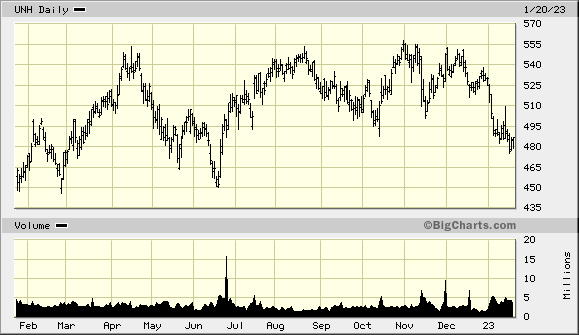
UnitedHealth Group Inc. (NYSE: UNH) is the largest health insurer in the industry in terms of both market value and revenue.

The company operates through four segments: UnitedHealthcare, Optum Health, Optum Insight and Optum Rx. Through these segments, UnitedHealth has one of the largest healthcare businesses in the world and offers a huge variety of products.
Additionally, the company offers health benefit plans and services for employers of all kinds through its UnitedHealthcare business, as well as individuals. The Optum business collectively offers health management services, software and advisory services, and pharmacy care and medication fulfillment, among others.
UnitedHealth was founded in the late 1970s. It generates about $325 billion in annual revenue and trades with a market cap of $500 billion.
For the last 13 years, the company has increased its dividend each year and it has shown a willingness to raise its dividend rapidly over time.
2) Costco Wholesale Corporation (Nasdaq: COST)
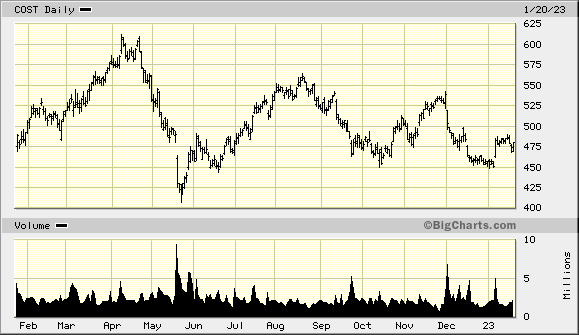
Costco Wholesale Corporation (Nasdaq: COST), together with its subsidiaries, engages in the operation of membership warehouses in the United States, Puerto Rico, Canada, the United Kingdom, Mexico, Japan, Korea, Australia, Spain, France, Iceland, China, and Taiwan. It offers branded and private-label products in a wide range of merchandise categories.
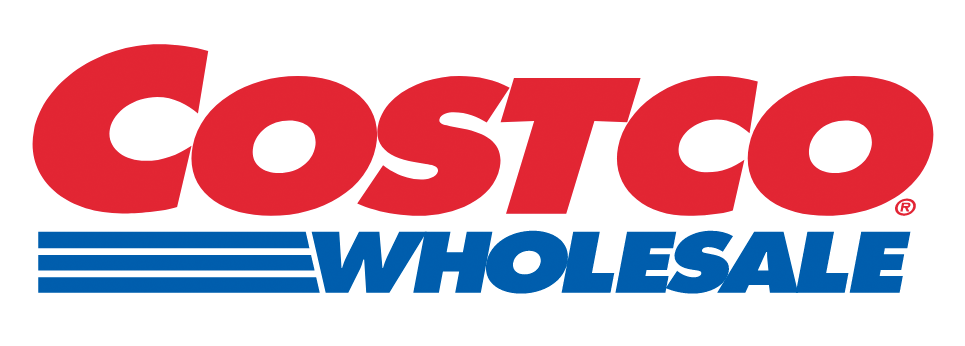
The company generates a large amount of its profits from its annual membership fees, which provide its customers access to bulk prices on many household and grocery items.
This membership fee approach gives the company an evergreen business model that allows it to stay ahead of inflationary pressure and rising expenses, providing value to shareholders all the while.
Between fiscal 2017 and 2022, Costco’s annual revenue grew at a compound annual rate of 12% as its earnings per share increased at a rate of 17%. Over the past five years, its stock has risen nearly 160% and delivered a total return of 175% after factoring in its reinvested dividends.
The recent pullback from the company’s all-time share price high has provided an opportunity for investors to potentially purchase the shares at an attractive entry point.
3) NextEra Energy, Inc. (NYSE: NEE)
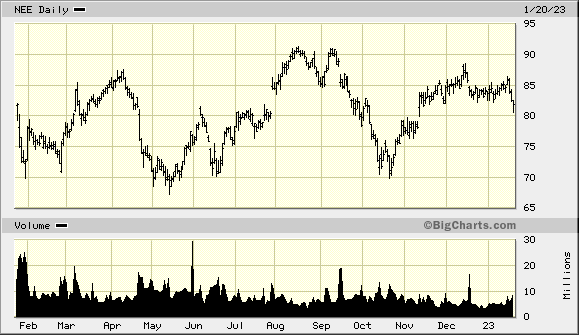
NextEra Energy, Inc. (NYSE: NEE), through its subsidiaries, generates, transmits, distributes, and sells electric power to retail and wholesale customers in North America. The company generates electricity through wind, solar, nuclear, coal, and natural gas facilities and by market cap is the largest publicly traded electric utility in the United States.
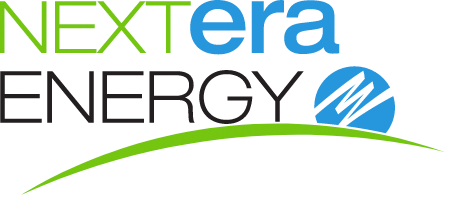
It also develops, constructs, and operates long-term contracted assets that consists of clean energy solutions, such as renewable generation facilities, battery storage projects, and electric transmission facilities; sells energy commodities; and owns, develops, constructs, manages and operates electric generation facilities in wholesale energy markets.
Even in a recession, demand for electricity and natural gas tends to remain steady – and that is a big reason why companies like NextEra Energy are so attractive to investors in times like these.
The company also is positioned well for growth as a major player in the clean energy industry, with a backlog of nearly 20 gigawatts as of the end of the third quarter of 2022.
4) The Home Depot, Inc. (NYSE: HD)
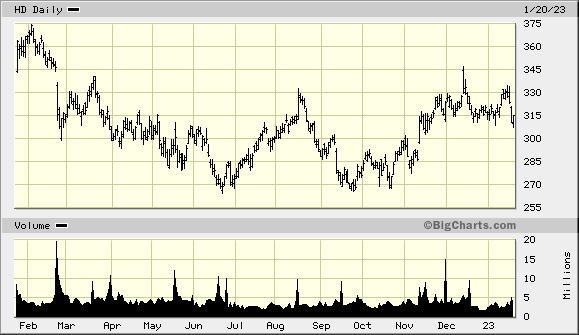
The Home Depot, Inc. (NYSE: HD) operates as a home improvement retailer. It operates The Home Depot stores that sell various building materials, home improvement products, lawn and garden products, and décor products, as well as facilities maintenance, repair, and operations products.
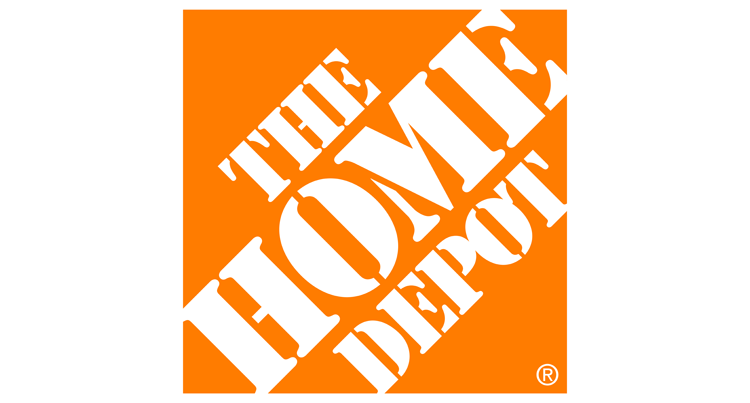
The company also offers installation services for flooring, cabinets and cabinet makeovers, countertops, furnaces and central air systems, and windows. In addition, it provides tool and equipment rental services.
During the recessions of 2008 and 2020, Home Depot delivered for investors, outperforming the S&P 500 on both occasions.
As homeowners become more cautious about buying and selling real estate during market volatility, they tend to spend more on renovating their existing space and that bodes well for companies like Home Depot.
Home Depot is the clear leader in the home-improvement industry, with 17% of the overall $900 billion market. In addition, the company has increased its sales per retail square foot from $391 in fiscal 2016 to $605 in 2021, all while paying an attractive dividend yield of 2.4%.
5) Unilever PLC (NYSE: UL)
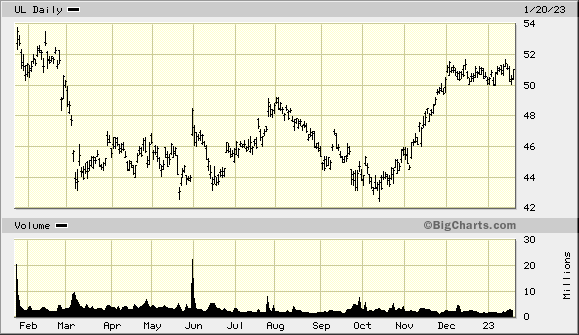
Unilever PLC (NYSE: UL) is one of the largest and most famous consumer staples manufacturers in the world.
The company operates as a fast-moving consumer goods company. It operates through Beauty & Personal Care, Foods & Refreshment, and Home Care segments.

The Beauty & Personal Care segment provides skin care and hair care products, deodorants, and skin cleansing products. The Foods & Refreshment segment offers ice cream, soups, bouillons, seasonings, mayonnaise, ketchups, and tea categories. The Home Care segment provides fabric solutions and various cleaning products.
With a wide range of highly recognizable brands – including Ben & Jerry’s, Vaseline, Dove, Hellman’s and Axe – the company offers investors consistency and quality even in difficult markets.
In many cases, Unilever’s brands own a dominant position in their market, giving the company a strong advantage when a rough economy threatens smaller competitors.